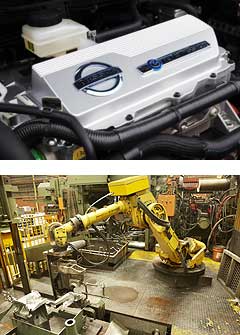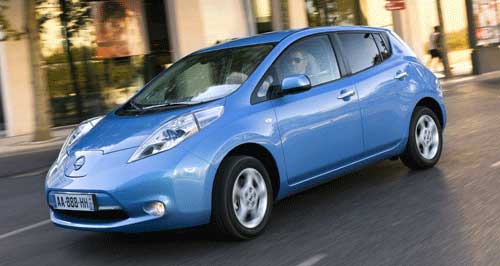News - Nissan - LeafAussie parts set to drive Nissan LeafLocal ingenuity: Nissan Australia CEO Dan Thompson with the Leaf's inverter, for which Nissan's Dandenong casting plant will produce aluminium components. Nissan’s electric Leaf to get Australian components as casting factory fights back16 Mar 2011 AUSTRALIAN parts made in a Victorian factory that was perilously close to being shut forever just nine months ago will help to drive Nissan’s ground-breaking Leaf electric car for global markets. Three aluminium castings using a new Australian-developed high-tech process at Nissan Casting Plant in Dandenong, Victoria, will be exported at the rate of 22,000 a month to three Nissan plants assembling the new Leaf – the world’s first mass-produced full-electric five-door hatchback – from early next year. The $21 million project – partly funded by a $3.3 million grant from the federal government’s now-defunct Green Car Innovation Fund – will generate $160 million in export earnings over the next five years and help to secure the factory and its 145 jobs. The three castings for the Nissan Leaf’s electric inverter and its accompanying cooling system – and a fourth casting that is yet to be announced – are critical components of the drivetrain of the EV that is due to go on sale in Australia in early 2012 as part of a global roll-out that started in Japan last year. The Corolla-sized Nissan Leaf has a range of up to 170km, driven by an 80kW/280Nm electric motor powered advanced lithium-ion batteries.  Left: Nissan Leaf electic motor. Below: Nissan's casting plant at Dandenong. Left: Nissan Leaf electic motor. Below: Nissan's casting plant at Dandenong.The imported hatch is set to become Australia’s third full-EV after the smaller Mitsubishi i-MiEV and Tesla Roadster. Announcing the deal that was won against rival bids from other Nissan casting plants around the world, Nissan Australia CEO Dan Thompson revealed that the company had come “very close” to closing the 30-year-old plant in the wake of the global financial crisis last year. “I can be quite candid and tell you that it was only in the recent past that we took a detailed look at the future viability of casting aluminium parts in Australia,” he said. Mr Thompson told GoAuto that the decision on the future of the casting plant – the last remnant of Nissan’s car manufacturing operations in Australia – came so close in July last year that Nissan Australia had drawn up two sets of forward plans for the Australian company – one including the casting plant business and another without. He said a change of plant management, improved productivity and the good prospect of winning the new Nissan Leaf casting contract all combined to convince Nissan’s head office in Yokahama to keep the plant open. “Now, the Nissan Casting operation has never been busier,” he said, adding that it was working three shifts a day, seven days a week. Mr Thompson said the federal green car grant and financial help from the Victorian government had helped to get the Leaf casting deal over the line, as did advanced casting technology developed by the CSIRO and its Centre for Applied Special Technology (CAST). According to Nissan, the technology allows for the castings to be treated after the casting process to better dissipate heat – a major factor in high-voltage applications such as the EV drivetrain. Plant managers said Nissan’s Japanese engineers had been amazed at the Australian-developed process – a world first – that is likely to lead to other casting contracts. About $13 million will be spent on new tooling for the Leaf casting process and the remaining $8 million will go towards refurbishments at the plant which Mr Thompson said had not received a significant upgrade since it opened almost 30 years ago. Back then, Nissan was building more than 60,000 cars in Victoria at its Clayton plant – one of five local manufacturers at the time. But the doors on the assembly plant clanged shut in the “recession we had to have” in February 1992, leaving the casting plant to survive on exports to Nissan plants elsewhere and occasional business from other car-makers in Australia. After coming close to presiding over another heartbreaking plant closure in Australia – as his predecessor Leon Daphne did 20 years ago – Mr Thompson is now talking of expansion of the plant’s activities on the back of the Leaf success. The company is already planning to introduce production of accessories such as aluminium tow bars and nudge bars at the plant which is also exporting 42 types of castings to 17 vehicle assembly plants around the world in Japan, Thailand, Mexico and the United States. Nissan says work on refurbishing the plant will start almost immediately and installation of the new equipment will begin later in the year. Test production should start by the end of the year, with full mass production ramping up in early 2012. So far, production of the Leaf has been restricted to Nissan’s Oppama plant in Japan, but by 2013, production will also begin at the Nissan’s US factory at Smyrna, Tennessee, and Sunderland, England. Nissan Leafs are already on sale in small numbers in Japan, the US and UK, and will finally hit Australia showrooms in about March next year. Before then, Nissan will import 16 Leafs for the Victorian government’s EV fleet trial, to be rotated through a number of fleets and private users to gather data.  |
Click to shareNissan articlesResearch Nissan Motor industry news |














Facebook Twitter Instagram